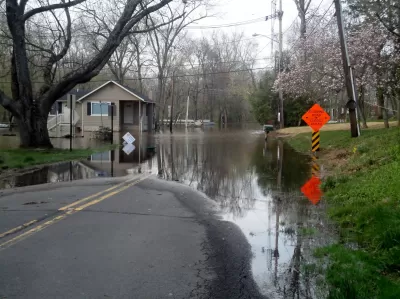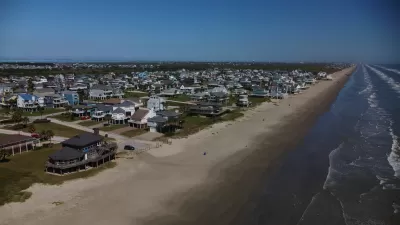Climate change-fueled sea-level rise could cause a housing crisis of a new sort if the federal government doesn't reconsider valuation policies.

In their recent opinion piece, Katie Oran and Yuliya Panfil describe what they predict to be the effect of climate change on the future of housing in the United States. Oran and Panfil warn of a new kind of housing crisis, destroying home values and potential causing a major housing market crash, caused by neglecting to consider sea-level rise.
According to a report from First Street Foundation, federal flood maps don't account for 67% of homes at risk of flooding. Readers can use the organization's Flood Factor tool to determine current and future flood risk by address.
Oran and Panfil account for the damager caused by flooding in monetary terms:
Between 1980 and 2019, the cost of storm damage in the United States has totaled $1.75 trillion. That is $300 billion more than the estimated total value of all property that sits within 700 feet of the US coastline. To put it simply: the US Government and private insurance companies have spent more money rebuilding damaged coastal property than it would have cost to relocate every single home within this risky zone.
Risky mortgages are re-packaged and sold to such government-secured enterprises as Fannie Mae and Freddie Mac. Oran and Panfil call to stop insatiable subsidization and for a government response that acts to consider the climate change risk in valuation and incentivize relocation and buy-out packages in a process of managed retreat.
"The key, however, is for the government to listen to the science and act now to prevent Americans from being swept up in another housing crisis, this time caused by climate change," opine Oran and Panfil.
FULL STORY: Climate change is threatening to create a new housing crisis in America

Alabama: Trump Terminates Settlements for Black Communities Harmed By Raw Sewage
Trump deemed the landmark civil rights agreement “illegal DEI and environmental justice policy.”

Planetizen Federal Action Tracker
A weekly monitor of how Trump’s orders and actions are impacting planners and planning in America.

The 120 Year Old Tiny Home Villages That Sheltered San Francisco’s Earthquake Refugees
More than a century ago, San Francisco mobilized to house thousands of residents displaced by the 1906 earthquake. Could their strategy offer a model for the present?

Opinion: California’s SB 79 Would Improve Housing Affordability and Transit Access
A proposed bill would legalize transit-oriented development statewide.

Record Temperatures Prompt Push for Environmental Justice Bills
Nevada legislators are proposing laws that would mandate heat mitigation measures to protect residents from the impacts of extreme heat.

Downtown Pittsburgh Set to Gain 1,300 New Housing Units
Pittsburgh’s office buildings, many of which date back to the early 20th century, are prime candidates for conversion to housing.
Urban Design for Planners 1: Software Tools
This six-course series explores essential urban design concepts using open source software and equips planners with the tools they need to participate fully in the urban design process.
Planning for Universal Design
Learn the tools for implementing Universal Design in planning regulations.
Clanton & Associates, Inc.
Jessamine County Fiscal Court
Institute for Housing and Urban Development Studies (IHS)
City of Grandview
Harvard GSD Executive Education
Toledo-Lucas County Plan Commissions
Salt Lake City
NYU Wagner Graduate School of Public Service





























